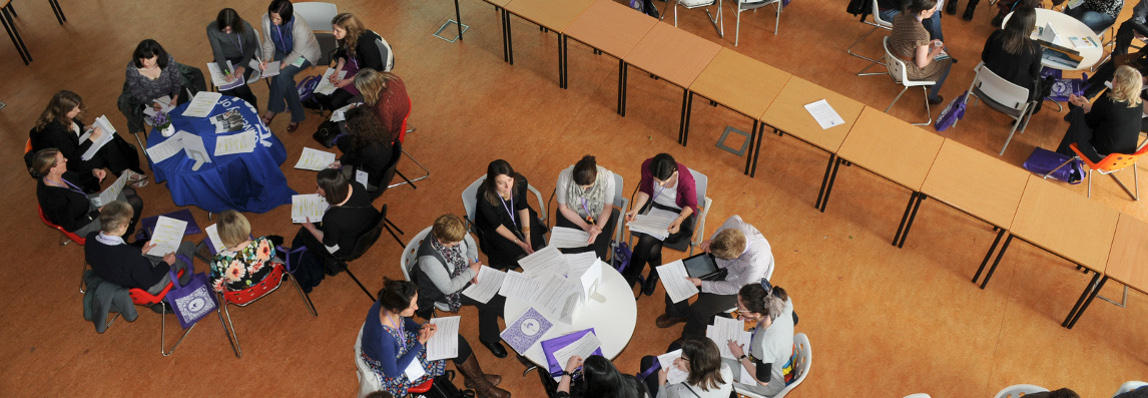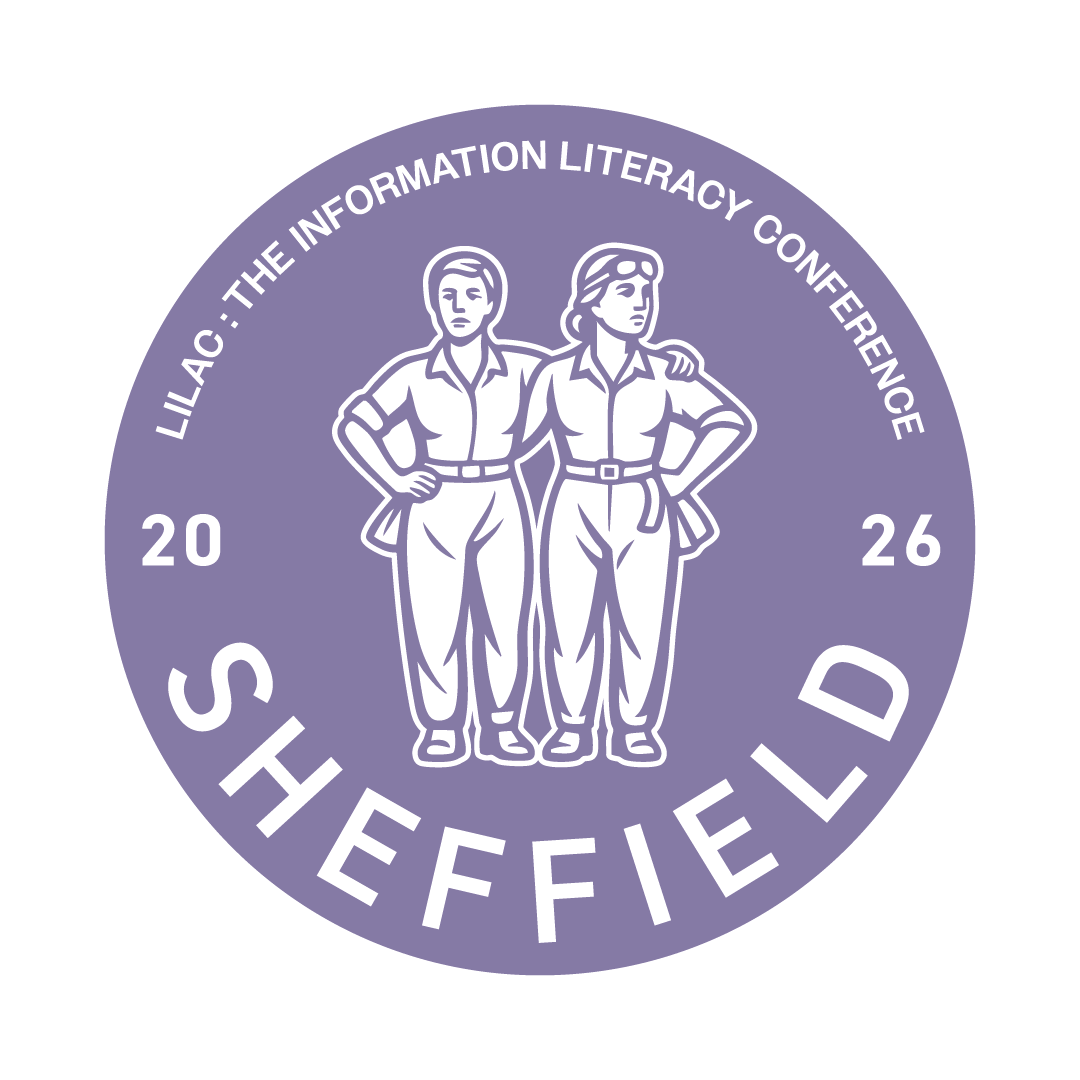
On this page you will find details of:
A selection of photos from the conference can be found on our flickr.
Megan Oakleaf (Assistant Professor in the iSchool, Syracuse University).
Lord Puttnam of Queensgate, C.B.E. (Chancellor of the Open University).
Tara Brabazon (Professor of Communication in the Faculty of Social Science and
Humanities, University of Ontario Institute of Technology (UOIT)).
The themes for LILAC 2012 were:
Aston, S. & Johnston, L. (2012). Digital detoxing – librarians and information literacy. Information Today [Online]. Available at: http://www.infotoday.eu/Articles/Editorial/Featured-Articles/Digital-detoxing—librarians-and-information-literacy-81988.aspx (Accessed: 26 April 2012).
Blake, M. & Halford, S. (2012). LILAC 2012: Librarians’ Information Literacy Conference. SCONUL Focus, 55, pp. 37-42 [Online]. Available at: http://www.sconul.ac.uk/publications/newsletter/55/12.pdf (Accessed: 16 August 2012).
De Brun, C. (2012). LILAC: the view from a first-timer. Available at: http://www.slideshare.net/infolit_group/lilac2012-de-brun (Accessed: 8 November 2016).
Elliott, T. (2012). Student to LILAC Superhero. Journal of Information Literacy, 6(1), pp. 96-98 [Online]. Available at: http://ojs.lboro.ac.uk/ojs/index.php/JIL/article/view/CC-V6-I1-2012-1/1633 (Accessed: 25 June 2012).
Webber, S. (2012). Some links from the LILAC conference #lilac12. Information Literacy Weblog [Online]. Available at: http://information-literacy.blogspot.co.uk/2012/04/some-links-from-lilac-conference.html (Accessed: 26 April 2012).
Webber, S. (2012). Some more LILAC links #lilac12. Information Literacy Weblog [Online]. Available at: http://information-literacy.blogspot.co.uk/2012/04/some-more-lilac-links-lilac12.html (Accessed: 26 April 2012)
Abdulhadi, M., Clough, P. & Sen, B. Collaborative social tagging and information literacy (poster).
Adams, V., Llewellyn, C. & Oberlander, J. Entitlement: what does your title entitle you to?
Alderson-Rice, J. Library treasure hunts at the University of Kent (teachmeet).
Antonesa, M. & McAvinia, C. Information literacy and the case of the ‘natives’.
Aston, S. & Jeskins, L. To blog or not to blog that is the question for researchers.
Bark, C. & Martin, L. Essential information skills for researchers: a collaborative project to develop an online, open access resource.
Barr-Walker, J. & Russell, B. ‘Like’ing’ library instruction: reaching students using the library Facebook challenge (teachmeet).
Beal, A. Think before you click: steps on the road to independent learning.
Bean, E. Removing the barriers: supporting students entering higher education.
Beautyman, W. The road to information literacy: primary school children and their information seeking behaviour.
Befus, R. & McCann, S. Tell them, and they forget. Teach them, and they remember. Involve them, and they learn – incorporating active learning into information literacy.
Bergson-Michelson, T & Johnson, K. Predictive search: getting the most out of popular search engines.
Bird, S. Bridging the gap between secondary and tertiary education: the role of information literacy.
Bytoft Nyaas, E. & Suld, K. Embedded IL in university programmes: the result of a collaboration model between faculty and librarians.
Carbery, A. Information literacy through inquiry: using problem-based learning in information literacy instruction.
Chappell, D. InfosmART: pedagogical approaches to the teaching of information and research skills to creative practitioners.
Chester, S. Assessing information literacy with PROFiler (teachmeet).
Coetzer, L. Taking my LMS for a spin on the mobile information highway (poster).
Cohen, S.F. The missing link: librarians and the teaching identity.
Coonan, E., Webster, H., Wrathall, K. & Secker, J. A new curriculum for information literacy: strategies for implementation.
Cormie, V., McNae, H., Proven, J. & Aucock, J. 600 years and not standing still: how one academic liaison team responds to the ever changing needs of the research community.
Corrall, S. & Dove, J. Web scale discovery and information literacy: competing visions or mutual support?
Corrall, S. & Stubbings, R. Exploring good practice for research supervisors in information literacy development.
Cottrell, J. & Cohen, S.F. Real deal information literacy: designing and implementing meaningful instruction and assessment.
Cottrell, J. & Miller, M. Theory into practice: translating research into program development and improvement.
Coulbeck, S., Hadfield, E. & Field, P. The information journey.
Crawford, J. Policy making in information literacy – what does it mean?
Crowley, C. & Gale, J. Teaching systematic reviews (poster).
Crumpton, M. Teaching workplace information literacy in the community colleges.
De Brun, C., Bali, R.K., Naguib, R.N.G. & Marshall, I.M. ‘No decision about me without me’: collaborative opportunities to support shared decision-making in the NHS.
DeJoy, N., Miller, S., Amada, S. & Oberdick, B. Disciplinary literacy – a context for learning critical information literacy.
Dubicki, E., Gardner, S. & Gordon, L. LibGuides tips and tricks: thinking outside the box.
Dubicki, E. & Weetman DaCosta, J. Taking a peek under the academic kilt to see whether information literacy is revealed!
Dunne, S. Dear diary: the value of reflective journals in easing student transition (teachmeet).
Duvigneau, S., Goldstein, S. & Hepworth, M. A toolkit for monitoring and evaluating information literacy training interventions in Africa (poster).
Esposito, T. & Martinez, A. Sowing the seeds of IL in the mobile wilderness: using creative mobile DL tools to cultivate active learning in secondary schools (teachmeet).
Farmer, V., Corns, I. & MacLean, C. How can reading lists be effective information literacy tools? (See also: presentation of responses)
Foster, C. & Buchanan, S. Everyday life information seeking behaviour in adolescents (poster).
Frigo, E. & O'Kelly, M. Remodeling information literacy core competencies in the context of a general education curriculum.
Glass, B. & Walton, G. This house believes that librarians and their services are the barrier to information literacy.
Gleeson, C. Meeting the needs of distance learners: the creation of an interactive resource pack for library inductions (teachmeet).
Gullbekk, E. & Mikki, S. Libraries supporting research communities: partners in scientific communication.
Gwilt, R. & Widdicombe, K. The road map: an information literacy planning aid.
Harbour, C. & Isaac-Menard, R. Using current technologies to build relationships with academic staff: a series of workshops (teachmeet).
Hensley, M.K. Think like a librarian: best practices for offering open workshops (teachmeet).
Hepworth, M., Jackson, T. & Masuda, C. Information literacy in the workplace: identifying the information management capability needs of staff in a local government organisation.
Highton, M. Supporting academic colleagues in developing open content literacies.
Jackson, C. Benefits analysis of information literacy for employability (poster).
Jadefrid, M. From face-to-face to online to blended learning (poster).
Julian, S. Reinventing classroom space to re-energize information literacy instruction.
Kail, A. & LaPlaca Ricords, J. E-resources and information literacy: the next step.
Kelt, M. SMILE, we’re making the most of other peoples work – not reinventing the wheel!
Kennedy, M. & Ure, C. Screencasting: delivering information literacy sessions online for distance learning students (poster).
Kinikin, J. & Hench, K. Improved student engagement in a library skills course using poster presentations.
Lambert, J. SCARLET (special collections using augmented reality to enhance learning and teaching) (poster).
Landgren, L., Wiberg, A., Akramy, S. & Holm, B. Does it make any difference? An impact evaluation of the libraries educational activities at Lund University, Sweden.
Lincoln, H. Using an active learning task to engage students and involve them in the evaluation of an information literacy training session (teachmeet).
Luker, W. & Palmer, S. Embedding digital literacy as a graduate attribute at Leeds Metropolitan University.
MacLellan, F. Referencing and reading comprehension: research in progress.
Markgraf, J., Jennings, E. & Kishel, H. Lesson study: or, how we learned to stop lecturing and let the students learn.
Masson, A., O'Donnell, C. & Ross, V. Embedding information literacies into the curriculum design process: the Viewpoints experience.
McCluskey, C. Supporting research by being a researcher.
McKinney, P. & Sen, B. Reflection for learning: understanding the value of reflective writing for information literacy development.
Minkin, R., Gardner, P. & Holcomb, B. Writing for real: creative contexts for information literacy teaching and learning.
Moody, J. & Russell, K. Encounters of the digital kind (teachmeet).
Moss, J. & Russell, A. From Nelson to frogs: creative solutions through student collaboration (poster).
Natt, A. Is there such a thing as ‘business information literacy’? An approach for business schools to customise information literacy training course by course (poster).
Newton, A. & Pullinger, D. Acting on PhD student feedback to create new learning resources.
Nicholas, S. & Smith, S. Connecting Cardiff’s researchers: delivering and learning from a social media workshop for research students (poster).
Nicholls, J. & Head, J. Digidol – developing digital literacies.
Osif, B. Just-in-time tutorials for engineering students (teachmeet).
Parker, J. & Godwin, P. Information literacy – just an outdated buzzword?
Pavey, S. & Monk, R. Catch them early – information literacy based assessment for learning with year 8 at Box Hill School.
Potter, N. Increasing student engagement: using Prezi to create interactive library maps.
Price, G. Digital literacies as a postgraduate attribute.
Pritchard, P. A. S.P.O.T. on transitions: enhancing 21st century academic literacies in secondary school science students.
Pullinger, D. Changing the focus of induction to improve the student experience (teachmeet).
Rose, H. & Siddall, G. Reading lists – time for a reality check?
Russell, P., Kerins, G. & Ryder, G. Developing reusable learning objects at ITT Dublin via the Irish National Digital Learning Repository (poster).
Savova, M., Canuel, R. & Crichton, C. Mobile technology and information literacy instruction: the McGill Library experience.
Schneider, M. Don’t reinvent the wheel: resources to support the teaching of information literacy and academic skills across the curriculum.
Schneider, M. From e-learning to e-teaching: using real-time online support to maximise our reach (teachmeet).
Seiler, V., Miil, K. & Lepik, K. Student centred active learning approach in an online information literacy credit course for doctoral students.
Sharman, A. The roving librarian: keep taking the tablets.
Smith, S. & Edwards, A. Embedding information literacy skills as employability attributes.
Street, P. & Hawksworth, L. Involve, inform, inspire: reaching researchers through targeted training.
Tattersall, A., Freeman, J., Beecroft, C. & Potgieter, U. Learn something new in 20 minutes: bite-size sessions for research, teaching and collaboration (poster).
Towlson, K. & Eyre, J. Answering the employability agenda: multi-professional collaboration in an era of multiliteracies.
Travers, K., Mitchell, E. & Johnson, C. Online information literacy: creative in-house collaborations.
Walsh, A. Playing games and growing trees … not sucking lemons.
Walton, E. & Tatham, S. The student journey: a collaborative approach at the University of Sussex (poster).
Walton, G. Assessing the journey: online conversation as a means of active learning in information literacy.
Webb, H. Hive mind: how doctoral researchers can be supported by each other.
Westwood, H. Giving students a competitive edge: Cass Certification.
Wetzel Wilkinson, C. & Bruch, C. Courageous conversations: addressing underlying issues to advance information literacy.
Widdicombe, K. Getting creative with research: a case study approach to information literacy teaching at UCA.
Wright, J. Creating a song and a dance: creative induction for a creative faculty (teachmeet).
LILAC is great opportunity for our fellow professionals to present their ideas, share best practice and show case new thinking in our sector. If you have an idea then we'd love to hear about it. We have many options for the types of sessions you might run from a symposium to a workshop. Visit our Call for Presentations page to find out how to apply.
Places at this year's conference are likely to be in demand more than ever before. Each year our conference grows increasingly popular and this year promises to be no different. Don't miss out and book your place now for this year's conference.
We look forward to seeing you there!
